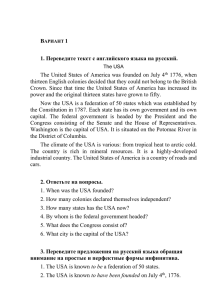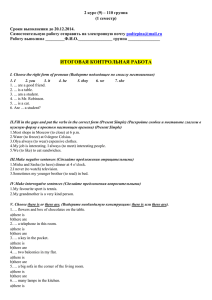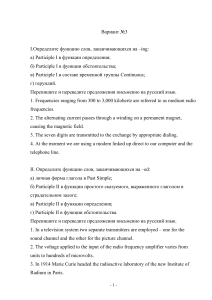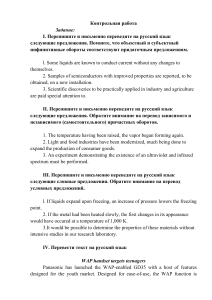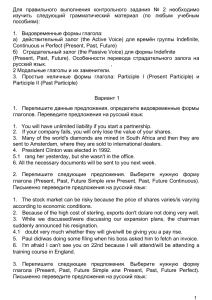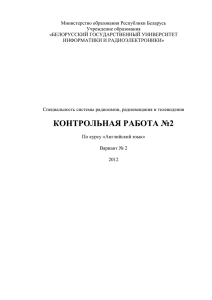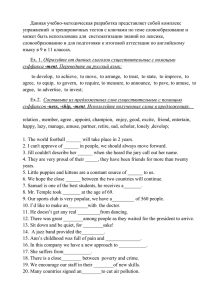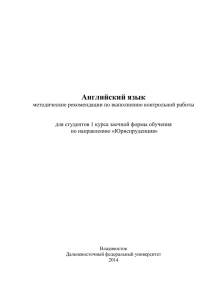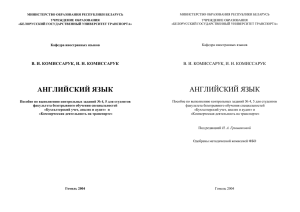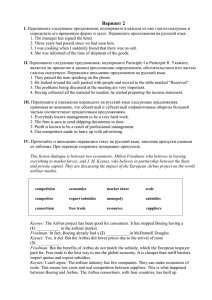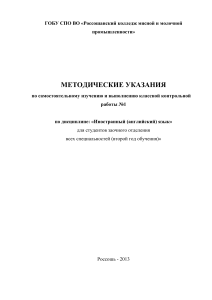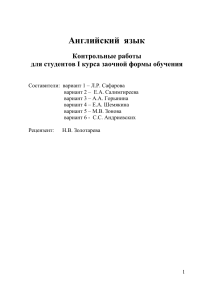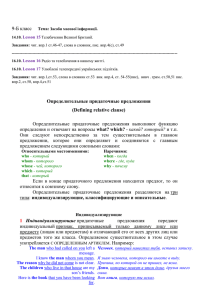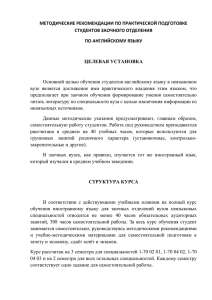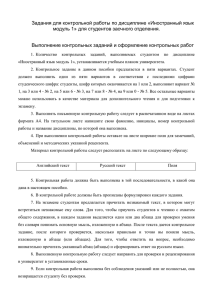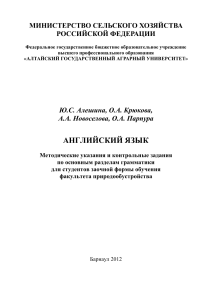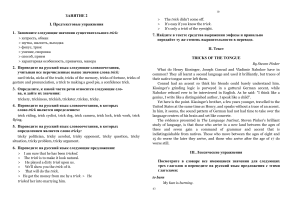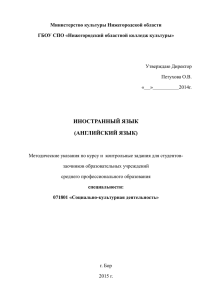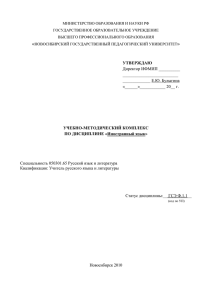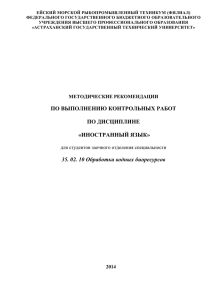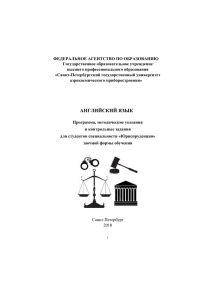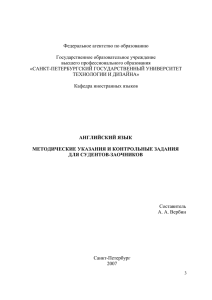ДИСЦИПЛИНА: АНГЛИЙСКИЙ ЯЗЫК Выполните письменную
advertisement
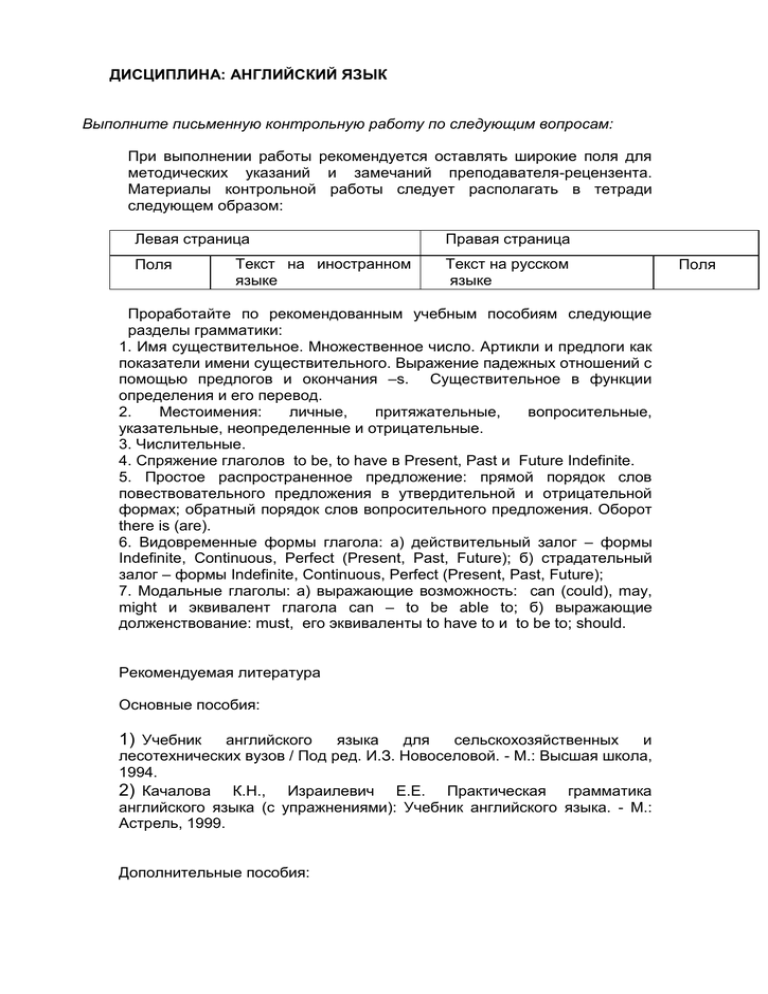
ДИСЦИПЛИНА: АНГЛИЙСКИЙ ЯЗЫК Выполните письменную контрольную работу по следующим вопросам: При выполнении работы рекомендуется оставлять широкие поля для методических указаний и замечаний преподавателя-рецензента. Материалы контрольной работы следует располагать в тетради следующем образом: Левая страница Поля Текст на иностранном языке Правая страница Текст на русском языке Проработайте по рекомендованным учебным пособиям следующие разделы грамматики: 1. Имя существительное. Множественное число. Артикли и предлоги как показатели имени существительного. Выражение падежных отношений с помощью предлогов и окончания –s. Существительное в функции определения и его перевод. 2. Местоимения: личные, притяжательные, вопросительные, указательные, неопределенные и отрицательные. 3. Числительные. 4. Спряжение глаголов to be, to have в Present, Past и Future Indefinite. 5. Простое распространенное предложение: прямой порядок слов повествовательного предложения в утвердительной и отрицательной формах; обратный порядок слов вопросительного предложения. Оборот there is (are). 6. Видовременные формы глагола: а) действительный залог – формы Indefinite, Continuous, Perfect (Present, Past, Future); б) страдательный залог – формы Indefinite, Continuous, Perfect (Present, Past, Future); 7. Модальные глаголы: а) выражающие возможность: can (could), may, might и эквивалент глагола can – to be able to; б) выражающие долженствование: must, его эквиваленты to have to и to be to; should. Рекомендуемая литература Основные пособия: 1) Учебник английского языка для сельскохозяйственных и лесотехнических вузов / Под ред. И.З. Новоселовой. - М.: Высшая школа, 1994. 2) Качалова К.Н., Израилевич Е.Е. Практическая грамматика английского языка (с упражнениями): Учебник английского языка. - М.: Астрель, 1999. Дополнительные пособия: Поля 1) Мюллер В.К. Англо-русский словарь. - Изд. 23-е. - М.: Русский язык, 1992. 2) Новый Большой англо-русский словарь: в 3-х т. / Апресян Ю.Д., Медников Э.М., Петрова А.В. и др. - М.: Рус. яз., 1997. 3) Большой англо-русский политехнический словарь / С.М. Баринов, Ф.Б. Борковский, В.А. Владимиров и др. - В 2 т. - М.: Изд-во “Руссо”, 1997. 4) Русско-английский политехнический словарь / Под ред. Б.В. Кузнецова - М.: Изд-во “Руссо”, 1997. 1. Перепишите предложения, вставляя неопределенные местоимения some, any, no и их производные (something, anything, nothing, somebody, anybody, nobody, somewhere, anywhere, nowhere). Переведите предложения на русский язык. 1. … windrowers now employ hydrostatic drive for propulsion, and that is used on .... farms today. 2. … who wants to sit the exam must pass their names to the dean’s office as late as next Monday. 3. … forgot their umbrella in the cloak-room of the University library two days ago. 4. This machine is very easy to use indeed. … can learn how to use it in a very short time. 5. If there are … words you don’t understand in this text on tractors, use .... dictionary you have. 6. I didn’t have … money about me, so I had to borrow … for purchasing .... fertilizer for my plants. 2. Перепишите предложения, заполняя пропуски необходимыми предлогами. Переведите предложения на русский язык. 1. There is something interesting … the properties … this gas in the scientific paper. 2. Newton was highly honored …. his countrymen ... his considerable contribution ... the world science. 3. Carbon is the most important element … all ferrous alloys, which are classed ... accordance .... it. 4. Mulching machines of this type are … very massive construction ... their better functioning. 5. It is recommended .... automobile engineers that cars are subjects … extensive road tests. 6. Air is mixed … vapour of petrol in the carburetor and then passes ... the combustion chamber. 3. Перепишите предложения, дополняя их подходящими по смыслу местоимениями. Переведите предложения на русский язык. 1. James Walt was a Scottish inventor and mechanical engineer, known for … improvement of the steam engine. 2. He retired from .... company and thereafter devoted … entirely to research work. 3. She put out … hand and took ... mirror. .... was dark and hard to see, but she still used .... for .... make-up. 4. I enjoyed … very much at the party, as ... were served very tasty toasts with cheese on .... . 5. Was the traffic bad today? Oh, yes, … was terrible, especially in Chicago and .... outskirts. 6. It is ..... own fault. We can only blame … for missing the steam boat for Leeds. 4. Перепишите предложения, вставляя соответствующие формы глаголов to have u to be. Переведите предложения на русский язык. 1. We … a lot of major problems with the quality of our soil cultivation machines. 2. The simplest gear … the spur one, which .... especially designed for this mechanism. 3. It … a sunny day when I first saw you in your newly refurnished farm workshop. 4. The gear … a toothed wheel or cylinder, and it ... transmitting the torque from one shaft to another. 5. Perhaps, Liz’s senior sister … in Farm Machinery class in time tomorrow it ... important for her. 6. The new car … more comfortable than the previous one, so I could drive for hours now. 5. Переведите предложения на русский язык (письменно). Поставьте вопросы к выделенным частям этих предложений. 1. At present much attention is paid to the quality of agriculture, and especially to soil fertility. 2. The operating process in a tractor depends mainly on its type and the make of the power plant. 3. Education after sixteen is voluntary in Britain, and anyone can make his choice freely. 4. Stephenson’s early locomotives were used to carry loads in coal mines as they don’t do today. 5. The technical material to be shaped for engineering reasons is called the workpiece. 6. The Romans were the first to settle and occupy the Celtic fortress of Londinium in the 1st century BC. 6. Перепишите текст, дополняя его словами под чертой. Переведите текст на русский язык. For hundreds of years … have built bridges over fast-flowing rivers or … and … canyons. Early people probably got the idea of a … from a tree fallen across a ... . From this at a later stage, a bridge on a very simple … or cantilever principle was evolved. … were embedded into the ... on each side of the river with their ends … over the … . Stream, bracket, water, timber beams, men, extending, banks, deep, rocky, bridge 7. Перепишите предложения, употребляя данные в скобках глаголы в соответствующей видовременной форме. Переведите предложения на русский язык. 1. Recent progress in hydraulic devices (make) hillside models more efficient and economic. 2. This week the Moscow region (receive) thirty-two new Don combines for its farms. 3. Electricity also (operate) various automatic devices: irons, fodder heaters, milk coolers, etc. 4. I’m sure Tom (get) the job with John Deere Company tomorrow. He (be) a talented engineer. 5. I (not smoke) for two years now, as smoking (endanger) human health and (pollute) atmosphere. 6. The electrical equipment (control) the starting of the engine and the operation of its systems. 7. Last year Sheffield farmers (harvest) large crops of wheat, barley and oats. 8. The house (be) dirty when I (drop in). They (not clean) in it for long weeks. 9. At that time Watt was the partner of the inventor John Rockbeeck, who (finance) his researches. 10. In 1767, he (invent) an attachment that (adapt) telescopes for use in the measurement of distances. 11. The light in his flat (show) that Mrs. Hamlet (wait) for him for some four hours. 12. He hardly (do) it when they came to see who (struggle) with this problem in the design center. 8. Перепишите следующие предложения, подчеркивая в каждом из них модальные глаголы или их эквиваленты. Переведите предложения на русский язык. 1. Steels and its products may be used in different branches of industry and agriculture. 2. Computers can be divided into simple and complex devices basing on their make-up and hardware details. 3. Qualified engineers are to easily define the technological properties of these materials. 4. Carol Mitchell must be getting very bored with her routine job in the office. 5. I can’t find my bag anywhere. You might have left it in the tractor repair workshop. 6. You shouldn’t believe everything you read in the user manual provided by this Turkish manufacturer. 9. Переведите текст на русский язык (письменно) THE MODERN FARM TRACTOR Tractors may be classed according to type of engine, how the fuel gets into the cylitider. An internal combustion engine is one in which the fuel is burned, and the power is generated within a closed cylinder. An extemal combustion engine is one in which the fuel is burned outside of the cylinder, and the power generated confined in a separate space to be released through the cylinder. The engine used may be of two or four cycles, single or multiple cylinder, manifold or solid injection; low, medium or high compression; but it is still an internal com-tion engine. As such, it requires constant, systematic care and maintenance to insure the greatest efficiency and long life. The modern farm tractor is the result of many years of development. Its present efficiency is possible because of engineering progress in design, metallurgy, fuels, lubricants, manufacturing methods and in many other respects. The modern tractor may be said to be very closely related to the modern automobile, truck, airplane, etc. - all of them having one feature in common: the internal combustion engine. The farm tractor is capable of working long hours at capacity loads in the hcat and dust of summer or in the cold and snow of winter. Long continued good performance is known to depend upon the operator. A careless operator can allow tractor motor to ruin itself in a few minutes, whereas a careful operator can prolong indefinitely the useful life and efficiency of a similar motor. Small difficulties are to be prevented from becoming large ones, which may be time consuming and expensive. The high manifold temperatures required to vaporize low-grade fuels have the effect of reducing engine power by raising the temperature of the air in the fuel mixture. The heavy parts of these fuels often do not vaporize and simply run down the cylinder walls, washing away the lubricating oil, and diluting the oil in the crankcase. Taking all these factors into consideration, one may figure out that, theoretically, gasoline should develop 29.6 per cent more power than distillate.
